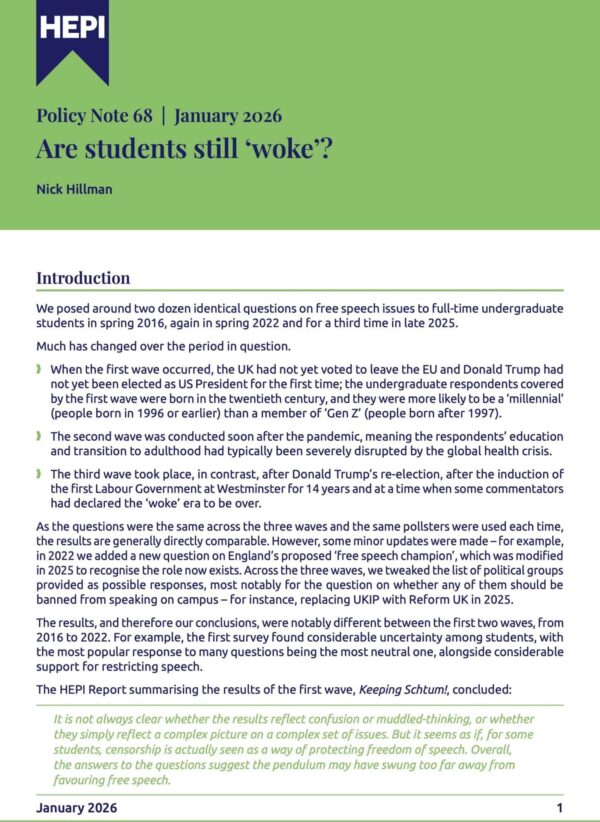Which UK regional economies are most reliant on international students?
Join HEPI for a webinar on Thursday 11 December 2025 from 10am to 11am to discuss how universities can strengthen the student voice in governance to mark the launch of our upcoming report, Rethinking the Student Voice. Sign up now to hear our speakers explore the key questions.
This blog was kindly authored by Emma Prodromou, Global Business Expansion and Immigration Manager, the Mauve Group.
The quiet engine driving local prosperity
Across the United Kingdom, international students have quietly become a vital source of regional economic strength. Those who come to the UK to further their education go on to bolster local economies and public services.
In fact, recent research reveals that UK regions now depend on international talent to a degree few policymakers fully appreciate.
The growing economic footprint of international students
The economic impact of international students in the UK surged from £31.3 billion in 2018/19 to £41.9 billion by 2021/22. On average, every parliamentary constituency in Britain benefits by £58 million.
Some regions rely more heavily than others on this influx of global talent. In Sheffield, for example, international students contribute around £770 million annually to the city’s economy, while across Yorkshire and the Humber, that total exceeds £2.9 billion. In cities such as Leicester, Exeter, Nottingham, and Dundee, universities are among the leading exporters, accounting for up to 15% of total local exports.
These figures show how universities serve as economic anchors, especially outside the Southeast. International students contribute through tuition, housing, local spending, and by supporting jobs in retail and hospitality.
Policy pressures and looming challenges
However, this success story faces rising challenges. Recent government policy changes, including visa restrictions and caps on dependents, threaten to undermine the financial stability of regional institutions. Such measures may disproportionately impact towns where universities are at the heart of the economic life.
At the same time, course closures are accelerating — nearly a fifth in agriculture and food studies, and around 10–12% in sciences and social sciences. These cuts expose a structural issue: as universities adapt to funding pressures and shifting demand, they risk losing expertise vital to regional and national priorities.
Competing for global talent
Faced with financial uncertainty and increasing global competition, UK universities are adopting new strategies to attract international students. Many of these initiatives draw inspiration from the government’s broader Industrial Strategy.
At the University of Southampton, a £4.35 million investment was secured through the Global Talent Fund, part of a £54 million initiative by the Department for Science, Innovation and Technology (DSIT). The aim is to recruit top global researchers to strengthen the UK’s research base and reinforce its global reputation for excellence.
Building regional innovation hubs
Other regions are leveraging academic expertise to foster innovation ecosystems. Swansea University has played a central role in developing a semiconductor cluster in South Wales. This reflects Wales’s growing profile on the global stage. In 2022, just 21% of prospective international students noted familiarity with Wales as a study destination. By 2025, that figure had more than doubled to 44%, especially in key markets such as India and the United States.
To help close skills gaps and boost innovation, Wales has opted to pass on the UK’s new 6% levy to international students. Welsh institutions are well-positioned to attract global talent, though graduates must still navigate the post-graduate visa landscape and local compliance rules when it comes to employment.
The rise of ‘dynamic pricing’ and scholarships
In an increasingly competitive global education market, British universities are also adopting more flexible pricing models to attract international students.
The University of Birmingham, Birmingham City University, and Sheffield Hallam University offer regional discounts targeted at applicants from India and Southeast Asia. Keele University automatically awards £5,000 scholarships to undergraduates who exceed entry requirements, while the University of the West of England (UWE) provides a £3,000 annual Global Success Scholarship for students who complete a set number of ambassador duties throughout the academic year.
These initiatives reflect a more entrepreneurial approach to recruitment, focused on affordability and global reach.
Education as soft power
Beyond economics, international education remains one of the UK’s most effective instruments of soft power. By attracting students from across the world, British universities build lasting global networks of alumni who go on to hold influential positions in business, government, and academia.
Amid mounting financial pressures, many universities are expanding overseas through international branch campuses, exporting British education while diversifying income. In India, institutions like York, Aberdeen, and Bristol plan local campuses, aligning with the UK–India Free Trade Agreement expected to add $34 billion in annual trade.
A delicate balance ahead
As the UK reshapes its immigration and higher education policies, it must balance fiscal restraint with global engagement. Excessive restrictions could damage universities and the regional economies that depend on international students.
International education is crucial to economic resilience, both locally and nationally, as well as to regional regeneration and global influence. As the data show, from Sheffield to Swansea, Leicester to Dundee, the UK’s prosperity is deeply intertwined with its ability to attract and retain top global talent.







Comments
Mark Bentley says:
Yet another powerful blog from HEPI, bringing a clear insight into the impact international students bring to local and regional economies.
The innovative vision of Swansea must be applauded, there is so much opportunity to take this model forward by other institutions in similar technological and innovative contexts.
Universities have to get closer to industry, developing greater collaboration than it has ever done in the past. Probably the last time both industry and education have ever been in a pragmatic space, was probably in the days of technical colleges, ‘local skills, for local people for local jobs’. This was a lifetime ago.
We are now in a different world where radical new models are needed to navigate HE through uncharted territory in the future.
It will be interesting to see how visionary our institutions will be.
The recently published White Paper ‘Post 18 Education and Skills’ I believe delivers a radical set of reforms for the HE sector, which is worth serious consideration. The direction of travel is clear. It brings focus to industry, skill and innovation, as the key enablers to growth, and prosperity, along survival for our HE industry.
It will truly have to be a ‘brave new world’ for the education sector, if it is to remain a leader on the global stage in the future.
Reply
Kalpna says:
Great insights in this post it’s eye-opening to see how regional UK economies lean heavily on international students. I also used https://www.studyinuk.com/
and found a wealth of information that complements your findings.
Reply
Jonathan Alltimes says:
What is the fiscal fuel for your engines?
The total accumulated UK student loan debt is likely to approach £300 billion in 2026.
The total accumulated UK government research and development expenditure since 2010 is of the same order of magnitude.
Accumulated UK public sector expenditure on tertiary education since 2010 is likely to exceed £100 billion.
The total accumulated fees from international students since 2010 is likely to be less than £90 billion.
Other sources of expenditure and income exist are unaccounted, such the cost of servicing UK government student debt or EU research grants to which the UK contribute.
It is UK taxpayers who are fuelling the universities and not the income from international students fees, which is in effect marginal revenue and from which international students derive extremely good value.
Reply
Replies
Jonathan Alltimes says:
We do not know the total accumulated postgraduate fees from UK-domiciled students who paid for themselves since 2010.
Reply
Add comment